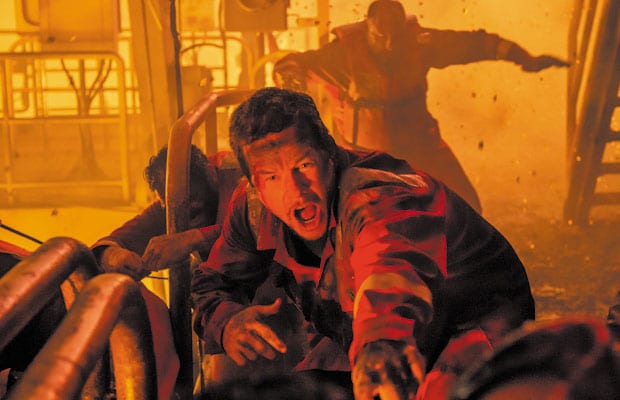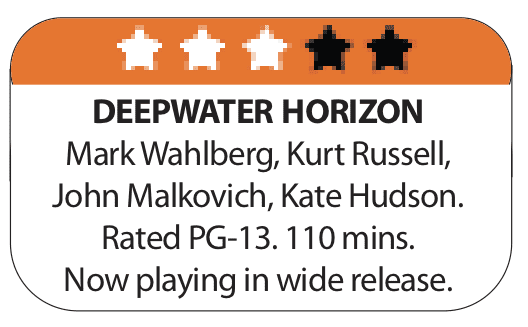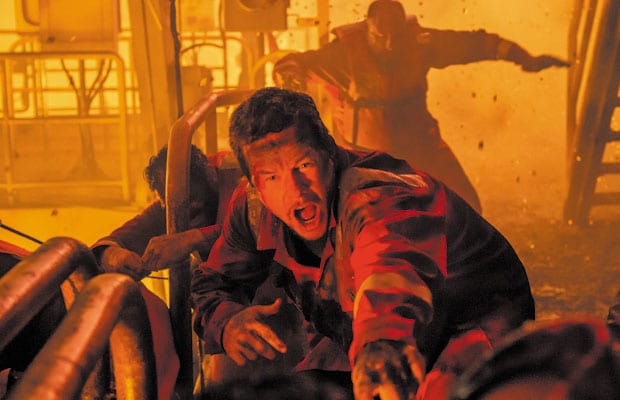Despite tropes, this film is a working-class winner

Mark Wahlberg plays the working-class hero of ‘Deepwater Horizon,’ and if you hadn’t noticed, Marky Mark has turned into a really good actor.
 The more I see Peter Berg films, the more convinced I become that he’s Michael Bay Lite. Despite affecting a veneer of indie cred — lots of handheld camera work and overlapping, improvisational-seeming dialogue that craves comparisons to John Cassavettes — there’s something slick and programmatic and simplistic about his films. It’s if he’s making the same one over and over, just replacing characters and plots. (It’s apparent also in his use of a kind of electric-hum background music.) The sameness is most apparent in his big-budget Hollywood tentpole wannabes: Hancock (a documentary-style superhero film that was a confused ear-rape of pointless noise) and Battleship (Milton Bradley’s grab to recreate Transformers — inspired by a board game! — that was handily the worst film of 2012).
The more I see Peter Berg films, the more convinced I become that he’s Michael Bay Lite. Despite affecting a veneer of indie cred — lots of handheld camera work and overlapping, improvisational-seeming dialogue that craves comparisons to John Cassavettes — there’s something slick and programmatic and simplistic about his films. It’s if he’s making the same one over and over, just replacing characters and plots. (It’s apparent also in his use of a kind of electric-hum background music.) The sameness is most apparent in his big-budget Hollywood tentpole wannabes: Hancock (a documentary-style superhero film that was a confused ear-rape of pointless noise) and Battleship (Milton Bradley’s grab to recreate Transformers — inspired by a board game! — that was handily the worst film of 2012).He did better in the still-overly-noisy war picture Lone Survivor, which first teamed him with Mark Wahlberg who, if you haven’t been paying close attention, has actually turned into one of the most watchable actors of his type. (Who knew Marky Mark has chops, not just abs?) Wahlberg again serves Berg’s style — a working class hero ethos, where sweaty men (football players, Marines, oil rig roughnecks) are always more heroic than moneyed businessmen and bureaucrats — in Deepwater Horizon. And this time it really works.
Based on the actual events that led to the BP eco-disaster in the Gulf of Mexico in 2010, it’s a disaster film with a Marxist attitude. Wahlberg is the plainspoken family man more concerned with safety than dollars; John Malkovich plays the grinning villain whose only concern is the bottom line. There’s never any confusion about who the good guys are: look for beleaguered studs in hardhats; the soft corporate types are to be booed.
Is it heavy-handed? To be sure. (Berg even casts himself, as he usually does, in a cameo — this time an inspector on a helipad who can’t be heard over the whirring rotors, suggesting something important was said but missed. See? He did all he could.) Simplistic, perhaps? Yes. And in fact, the first quarter is filled with stale tropes. (On the helicopter ride to the rig, we’re startled when a bird flies into the windshield nearly crashing it Sully-style because foreshadowing!) But it is tremendously effective for the genre, which builds to an exhaustive (and loud) climax. It’s The Poseidon Adventure for environmentalists.
And let’s face it: The Deepwater Horizon disaster was more than an ecological tragedy: It served as a cautionary tale for what happens with insulated corporations operate with unbridled greed. People died that night; no one went to jail. The film is as political as a big-money actioner can get these days.
This article appeared in the Dallas Voice print edition September 30, 2016.

